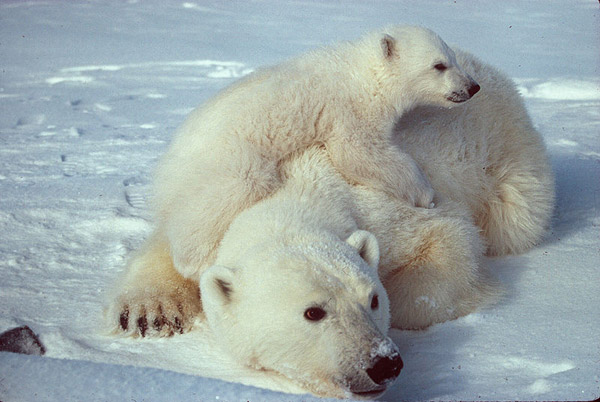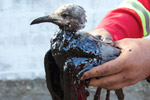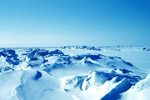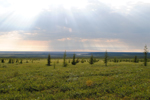Facing plunging profits, Royal Dutch Shell has announced it will cut exploration and development funding by nearly $10 billion this year, including halting their long-suffering plans to drill in the Arctic ocean. Shell’s new CEO, Ben van Beurden, made the announcement yesterday that controversial plans to drill off the Alaskan coast will be put on hold for another year.
The announcement comes just days after Shell suffered a legal setback in its efforts to drill in the Arctic Ocean, which has cost the company $5 billion and a series of embarrassing failures. Last week, a federal court ruled that the U.S. government hadn’t assessed the environmental risks of drilling in the Arctic Ocean. The lawsuit was brought to the court by environmental organizations and indigenous groups who fear an environmental disaster if Shell is allowed to drill in the Arctic seabed. Green groups have long said that fossil fuel companies have yet to prove they have the capacity to clean up an oil spill in the Arctic Ocean given stormy seas, extreme conditions, and ice cover for much of the year.
“The lack of a clear path forward means that I am not prepared to commit further resources for drilling in Alaska in 2014,” van Beurden said in a statement. “We will look to relevant agencies and the court to resolve their open legal issues as quickly as possible.”
Moreover, green groups have criticized fossil fuel companies for seeking to exploit reserves in the Arctic when scientists have begun warning that most fossil fuel reserves will have to be left in the ground to avoid catastrophic climate change.
Still, while Shell will not be drilling in the Arctic this year, the Russian company, Gazprom, made history in December by being the first company to exploit offshore oil reserves in the Arctic Ocean.
In the fourth quarter of 2013, Shell’s adjusted earnings fell 48 percent, while it’s annual earnings were 23 percent down from 2012.

Environmentalists fear that an oil spill in the Arctic Ocean could be devastating for wildlife, including polar bears, which are already hugely impacted by climate change. Photo by: Scott Schliebe.
Related articles
A series of oil spills sully Caribbean paradise, coating mangroves and wildlife (photos)

(01/29/2014) On December 17th, officials first discovered a massive oil spill in the Caribbean-island nation of Trinidad and Tobago. Since then, a series of oil spills have been discovered, coating beaches, sullying mangrove forests, and very likely decimating wildlife in Trinidad’s Gulf of Paria. The oil spills have been linked to the state-owned oil company, Petrotrin, which has claimed that sabotage is behind at least two of the spills. However Trinidad and Tobago’s Environmental Management Authority has recently slapped the company with a $3.1 million fine by for the damage, while some politicians have called for an independent investigation into the slew of spills.
World first: Russia begins pumping oil from Arctic seabed
(12/23/2013) Oil has begun to be pumped from the Arctic seabed, according to Russian oil giant, Gazprom. The company announced on Friday that it has begun exploiting oil reserves at the offshore field of Prirazlomnoye. The project, which is several years behind schedule, is hugely controversial and made international headlines in September after Russian military arrested 28 Greenpeace activists protesting the operation along with a British journalist and Russian videographer.
Gulf of Mexico deep sea may need decades to recover from oil spill

(11/20/2013) The catastrophic explosion that spewed some five million barrels of oil deep into the Gulf of Mexico in April 2010 will take a heavy toll in the ocean’s lowest layers for years to come. That’s the stark conclusion of seafloor research conducted six months after the Deepwater Horizon oil spill. The study, published on August 7 in PLoS ONE, examined life in the Gulf’s deepest waters near the blowout, about 1.6 kilometers below the surface. Here, the researchers found that the damages will take decades to reverse.
‘Heading towards an ice-free Arctic’: sea ice extent hits sixth lowest on record

(09/18/2013) Sea ice cover in the Arctic shrank to one of its smallest extents on record this week, bringing forward the days of an entirely ice-free Arctic during the summer. The annual sea ice minimum of 5,099m sq km reached on 13 September was not as extreme as last year, when the collapse of sea ice cover broke all previous records.
At top of the world, activists say exploiting Arctic is ‘utter madness’
(04/17/2013) Four young explorers including American actor Ezra Miller have planted a flag on the seabed at the north pole and demanded the region is declared a global sanctuary. The expedition, organized by Greenpeace, saw the flag lowered in a time capsule that contained the signatures of nearly 3 million people who are calling for a ban on exploitation in the region.
By 2050 much of the Arctic could be green

(04/01/2013) Warming about twice as fast as the rest of the world, the Arctic is already undergoing massive upheavals from climate change: summer sea ice is thinning and vanishing, land based ice sheets are melting, and sea levels are rising. Now a new study in Nature Climate Change predicts that vegetation cover in the Arctic could expand by over 50 percent by 2050. Although increased vegetation would sequester additional carbon, this would be more-than-offset by the loss of the albedo effect, whereby sunlight bounces off white (snow and ice covered) parts of the Earth.
Global warming to open new Arctic sea lanes
(03/05/2013) Rapidly melting sea ice in the Arctic due to global warming will open new shipping lanes that will speed transit between northern Asia, Europe, Canada and Alaska but unleash new safety, environmental and legal issues, according to scientists writing in this week’s issue of the Proceedings of the National Academy of Sciences.
Shell suspends Arctic oil drilling for the year
(02/27/2013) Royal Dutch Shell announced today that it was setting “pause” on its exploratory drilling activities in the Arctic for 2013. Shell’s operations are currently under review by the federal government after the oil company suffered numerous setbacks during last year’s opening attempt to drill exploratory wells in the Beaufort and Chukchi Seas, including running its drilling rig aground on Sitkalidak Island in southern Alaska in late December.